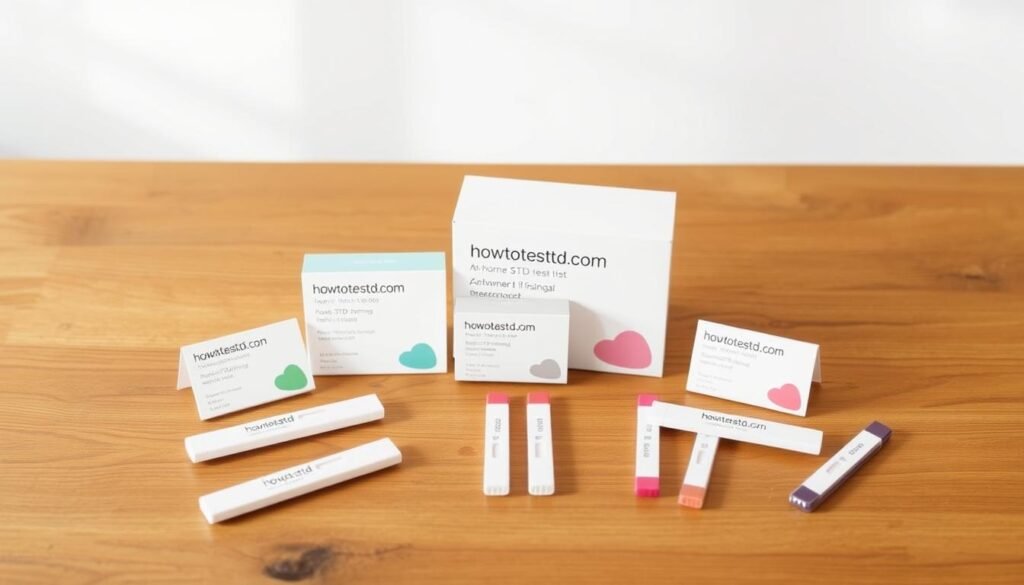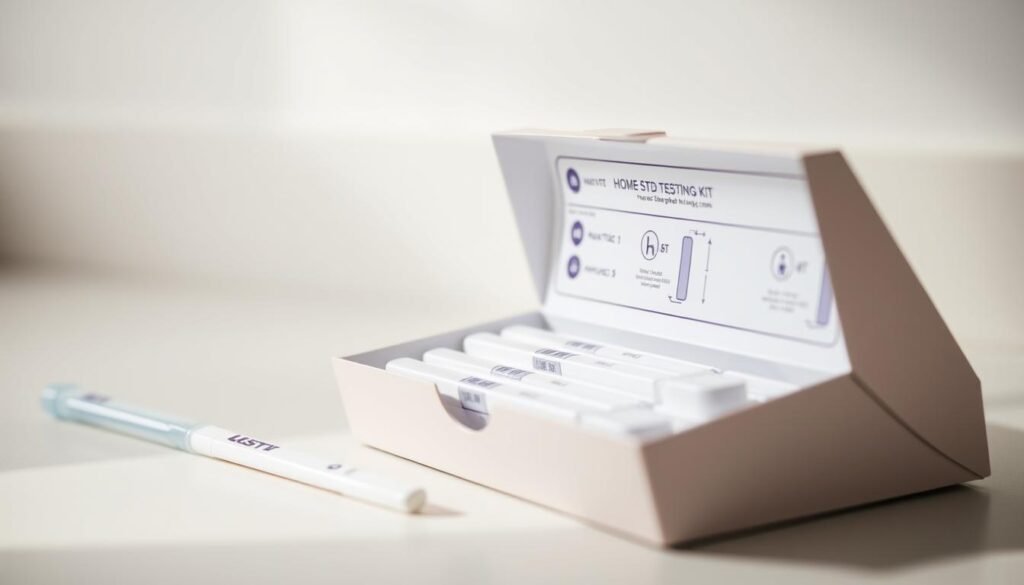Convenient At-home STD Test Kits for Private Testing
Did you know that 1 in 5 Americans will get an STD at some point? This shows how important it is to test for health issues. Now, with at-home testing solutions, you can check your health without anyone knowing.
At-home STD test kits are great because they’re easy and private. You can test for STDs at home, without going to a doctor. This helps you stay healthy in a way that feels right for you.
Key Takeaways
- At-home STD testing provides convenience and privacy.
- Easy STD testing at home encourages proactive health management.
- Private STD test at-home kits reduce the discomfort of clinical visits.
- At-home testing solutions are becoming increasingly popular.
- Proactive health testing is key for catching and treating diseases early.
The Rising Popularity of At-home Health Testing
At-home health testing kits are getting more popular. People want private and easy ways to test their health.
The market for STD home testing and online STD test kits is growing fast. This is because of telehealth and more people knowing the value of health checks.
Recent Market Growth Statistics
The demand for at-home health testing has gone up a lot. Reports say the global market is growing fast.
| Year | Market Size | Growth Rate |
|---|---|---|
| 2020 | $1.2 billion | 15% |
| 2021 | $1.4 billion | 18% |
| 2022 | $1.7 billion | 20% |
Impact of Telehealth Expansion
Telehealth has helped at-home health testing grow. It makes getting and using testing kits online easier and more convenient.
Understanding At-home STD Test Kits and How They Work
At-home STD testing lets people check their health from home. These kits are easy to use and keep your test private. You don’t need to see a doctor to get tested.
Types of Specimens Collected
These kits ask you to collect a sample. This can be urine, blood from a finger prick, or a swab from your body. The kit will tell you what kind of sample you need.
Testing Methodologies Used
At-home STD test kits use advanced methods to test for diseases. They use PCR testing and antibody testing.
PCR Testing
PCR testing finds the genetic material of diseases in your sample. It’s great for finding Chlamydia and Gonorrhea. This method is very accurate and finds infections early.
Antibody Testing
Antibody testing looks for antibodies in your blood. These antibodies are made when your body fights off an infection. It’s used for HIV and syphilis. This test can show if you have the disease or not.
For more info on at-home STD testing, check out WebMD’s guide.
| Testing Method | Specimen Type | Common Uses |
|---|---|---|
| PCR Testing | Urine, Swab | Chlamydia, Gonorrhea |
| Antibody Testing | Blood | HIV, Syphilis |
A healthcare expert says, “At-home STD testing kits make it easier to take care of your health. They help reduce the shame of going to a doctor for tests.”
“At-home STD testing makes sexual health care more private and easy to get.”
Benefits of Private STD Testing at Home
At-home STD testing kits are a private and quick way to check your sexual health. They offer many benefits. These make them a great choice for those who want to test for STDs at home.
Privacy and Confidentiality
One big plus of at-home STD testing is the privacy and confidentiality it gives. You can take your samples at home. You don’t have to go to a clinic or talk about your health with doctors.
Convenience and Accessibility
At-home STD testing kits are also very convenient and easy to get. You can order them online and they’ll come right to your door. This is great for people who are busy or live far away.
Reduced Stigma and Anxiety
Also, at-home STD testing can lessen the stigma and anxiety of clinic tests. You can test yourself at home. This makes the whole process less scary.
| Benefits | Description |
|---|---|
| Privacy | At-home testing maintains confidentiality |
| Convenience | Kits are delivered and results are often available online |
| Reduced Stigma | Testing is done in the comfort of one’s own home |
In summary, private STD testing at home has many benefits. It’s a good choice for those who want to manage their sexual health.
The Importance of Proactive STD Testing
Getting tested for STDs is key to staying healthy and stopping infections. Regular tests help find infections early. This lowers the chance of spreading them and keeps you from getting sick later.
Recommended Testing Frequency
How often you should get tested depends on your risk. Centers for Disease Control and Prevention (CDC) say to test every year if you’re sexually active and under 25. Or if you have many partners.
Window Periods for Accurate Results
Knowing when to get tested is important for good results. The time you need to wait before testing varies by test and infection. For instance, HIV tests need 23 to 90 days to show results.
Asymptomatic Infections and Their Risks
Some STDs don’t show symptoms, but you can be infected. Asymptomatic infections can spread to others. And if not treated, they can cause serious health problems.
Common STDs That Can Be Tested With Home Kits
Home STD testing kits have changed how we check our sexual health. They let us test for STDs at home. This makes it easier and less scary than going to a clinic.
Now, we can test for many STDs at home. This includes both bacterial and viral infections. It also includes other health issues that affect sex.
Bacterial Infections
Bacterial STDs are caused by bacteria. They can be treated with antibiotics if caught early. Here are some common ones:
- Chlamydia: It’s very common and can cause big problems if not treated.
- Gonorrhea: This STD can cause infertility and increase HIV risk.
- Syphilis: It’s a serious infection that can get worse if not treated.
Viral Infections
Viral STDs are harder to treat than bacterial ones. Home tests can find several viral infections, like:
- HIV: It weakens the immune system.
- Herpes: It causes sores and spreads through skin contact.
- HPV: It can cause warts and some cancers.
Other Testable Conditions
Some home tests also check for other health issues. You can test for Hepatitis and Mycoplasma genitalium. This makes sure you get a full check-up.
How to Choose the Right At-home STD Test Kit
There are many at-home STD test kits out there. It’s important to think about a few things when picking one. Look at the type of test, how private it is, and how easy it is to use.

Single vs. Multiple STD Panel Tests
Deciding between a single test or a multiple STD panel test is key. Single tests are good for checking one specific infection, like chlamydia. Multiple STD panel tests check for many diseases at once, giving a full picture of your health.
- Single tests: Suitable for checking one specific STD.
- Multiple STD panel tests: Ideal for a full health check.
FDA-Approved vs. Laboratory-Developed Tests
It’s important to know if the test is FDA-approved or a laboratory-developed test. FDA approval means the test is safe and works well. Tests not approved by the FDA might be accurate but haven’t been checked as much.
“The FDA plays a critical role in ensuring the safety and effectiveness of medical devices, including at-home STD test kits.”
Digital Results vs. Phone Consultation Options
How you get your test results matters too. Some kits give you digital results online or through an app. This is quick and private. Others offer phone consultation options to talk about your results with a doctor.
For more info on home STD tests, check out UAB Medicine.
By thinking about these things, you can pick the right at-home STD test kit. This ensures you get a confidential and reliable test.
Step-by-Step Guide to Using Home STI Testing Kits
Using a home STI testing kit is easy. Just follow the steps in the kit. This way, you get accurate results and have a good experience.
Preparation and Timing
Before you start, get ready and make sure your area is clean. Read the instructions and know what samples you need. Also, check the timing of your test. Some tests need you to wait after possible exposure.
Sample Collection Techniques
Collecting your sample is key. You might need to give a urine, blood, or swab sample. Always follow the specific instructions for sample collection
Shipping and Results Processing
After you collect your sample, send it to the lab. Most kits have pre-paid shipping. After the lab checks your sample, you’ll get your results online or by phone.
By following these steps and using a good home STI testing kit, you can check your sexual health easily and privately.
Popular At-home STD Test Kits Available in the United States
The market for at-home STD test kits in the United States is growing. This is because more people want easy and private ways to test for STDs.
Comprehensive Multi-Test Panels
Many companies now sell multi-test panels. These panels check for many STDs at once. They are great for people who are active and want to make sure they don’t have any infections.
Everlywell and STDcheck have these panels. They test for chlamydia, gonorrhea, syphilis, HIV, and hepatitis.
Specialized Single-Condition Tests
There are also tests for just one STD. For example, OraQuick has an at-home HIV test. These tests are good for people worried about one specific infection.
Subscription-Based Testing Services
myLAB Box offers testing services you can subscribe to. You get test kits regularly. This makes it easy to test often.
“The convenience and privacy offered by at-home STD testing kits have revolutionized the way people approach sexual health,” said Dr. Jane Smith, a leading expert in sexual health.
When picking an online STD test kit, think about the test type, privacy, and accuracy. It’s also important to buy STD test kits from trusted places.
Accuracy and Reliability of Self STD Test Kits
It’s important to know how well home STD test kits work. Their accuracy depends on the test type, sample quality, and testing method.
Understanding Sensitivity and Specificity
Sensitivity means a test can find those with the infection. Specificity means it can find those without. A good test has high sensitivity and specificity.
A study on a self STD test kit showed it’s 95% sensitive and 99% specific for some STDs.

Comparing Home Tests to Clinical Testing
Home STD tests are compared to doctor’s tests for accuracy. Some home tests are very accurate, but others are not. It’s key to pick a confidential STD test kit from a trusted maker that follows FDA rules.
Factors That May Affect Test Results
Many things can change how accurate home STD test results are. These include the sample quality, when you take the test, and how well you follow the instructions. It’s important to take the test right and at the right time for the best results.
In short, self STD test kits are a good, private way to test. But, knowing their accuracy and reliability is key. By picking a good test and following the directions, you can get accurate results and take care of your sexual health.
Cost Considerations for Home STD Screening
Thinking about at-home STD testing? The cost is a big factor. Prices can change a lot. This depends on the test type, how many STDs it checks, and the provider’s prices.
Price Ranges for Different Test Types
At-home STD test kits vary in price. A simple Chlamydia and Gonorrhea test might cost $50 to $100. But, a test for HIV, Syphilis, and Herpes can be $200 to $300 or more.
Insurance Coverage Possibilities
Some insurances might pay for at-home STD tests. Check with your insurance to see what they cover. This can help lower your costs.
FSA/HSA Eligibility
FSAs and HSAs can also help. You can use pre-tax dollars for at-home STD test kits. This can make the cost lower for you.
Addressing Common Concerns About At-home STD Testing
At-home STD testing is getting more popular. Many people have worries about it. But, providers of at-home STD testing try to make users feel safe and sure about their tests.
Result Confidentiality and Data Privacy
Many worry about keeping test results and personal info private. Good at-home STD testing services use encrypted systems. This keeps your data safe and private.
They also follow HIPAA rules. This means your personal and health info stays safe.
Shipping and Packaging Discretion
People also worry about how their tests get sent. At-home STD test kits come in plain, unmarked packages. This keeps your test private and hidden.
Support Resources Available
Users like knowing they can get help. Many at-home STD testing services offer customer support. You can talk to them by phone, email, or online chat.
Some even let you talk to doctors. This helps with any questions or worries about your test results.
By tackling these worries, at-home STD testing services make users feel better. This helps everyone stay healthy and safe.
Conclusion: Taking Control of Your Sexual Health
Testing yourself is key to staying healthy. At-home STD test kits make it easy and private. You can check your health without going to a doctor.
Testing at home helps you know your health better. This way, you can catch infections early. It’s a big step towards being healthier and more informed.
Don’t delay in taking care of your health. Look into at-home STD testing options. Find what works best for you. With the right tools, you can make smart choices for your health.
FAQ
What are at-home STD test kits, and how do they work?
At-home STD test kits let you test for STDs at home. You collect samples like urine or blood. Then, you send them to a lab for testing. You get your results online or by phone.
Are at-home STD test kits accurate and reliable?
Yes, they can be if they’re FDA-approved. They use tests like PCR or antibody testing. But, results depend on the sample quality and the lab.
How do I choose the right at-home STD test kit for my needs?
Look at the STDs tested, the testing method, and support offered. Make sure it’s FDA-approved and the lab is CLIA-certified.
Can I use my insurance to cover the cost of at-home STD testing?
It depends on your insurance. Check with your provider to see if it’s covered. Find out what you’ll pay out of pocket.
How long does it take to get the results of an at-home STD test?
Results time varies. It’s usually a few days to a week after the lab gets your sample.
Are at-home STD test kits confidential and discreet?
Yes, good providers keep your info private. They use plain packaging. You get your results online or by secure phone call.
What kind of support is available if I have questions or concerns about my at-home STD test results?
Many providers offer help. You can talk to them by phone, online chat, or email. They help you understand your results and what to do next.
Can I purchase at-home STD test kits online?
Yes, you can buy them online from trusted sites. Make sure the site is legit and the kit is FDA-approved.
Are there any additional costs associated with at-home STD testing beyond the initial kit cost?
Some providers charge extra for things like fast shipping or phone calls. Check the costs and services before you buy.
Can I use FSA or HSA funds to purchase at-home STD test kits?
Often, you can use FSA or HSA for these kits. But, always check with your plan to be sure.
Related Posts

About anstd.com Local Accurate Private Fast STD Testing

STD Testing in Jacksonville, NC – Get Tested Now
